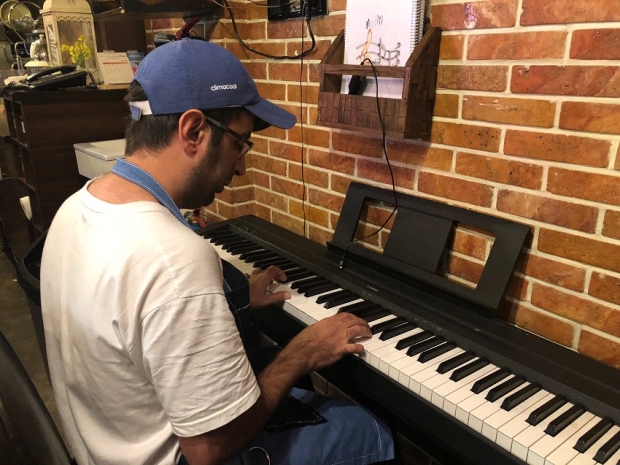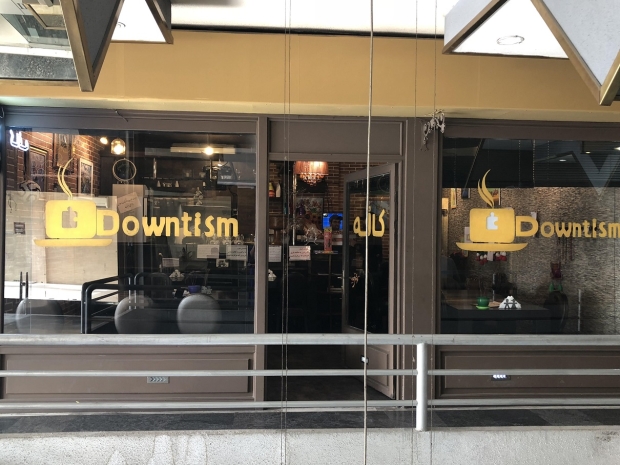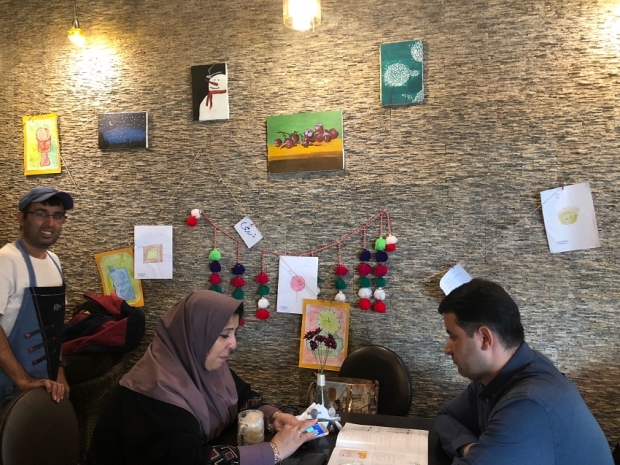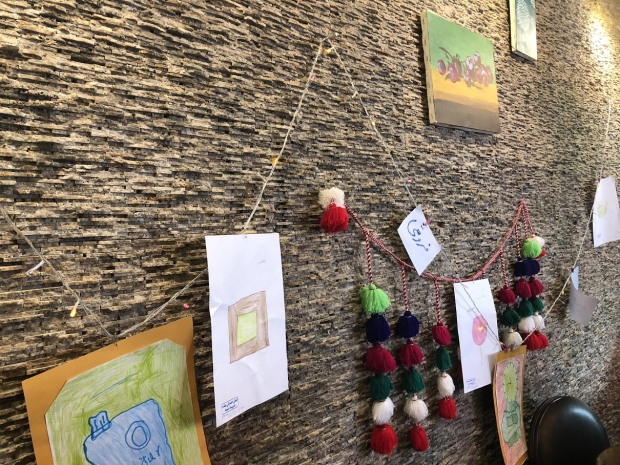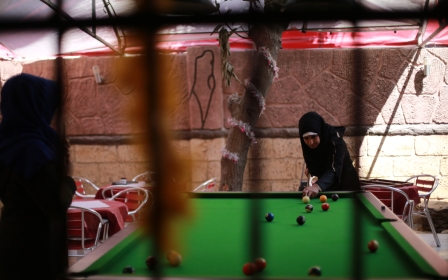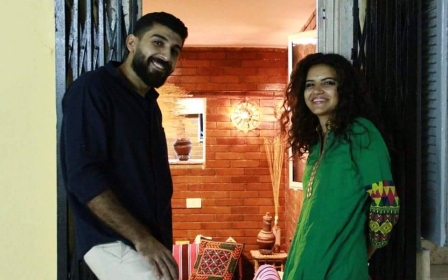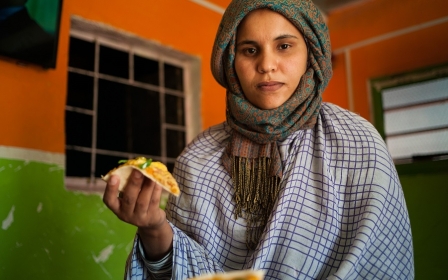Tehran's little secret: The cafe where disability is no barrier to talent
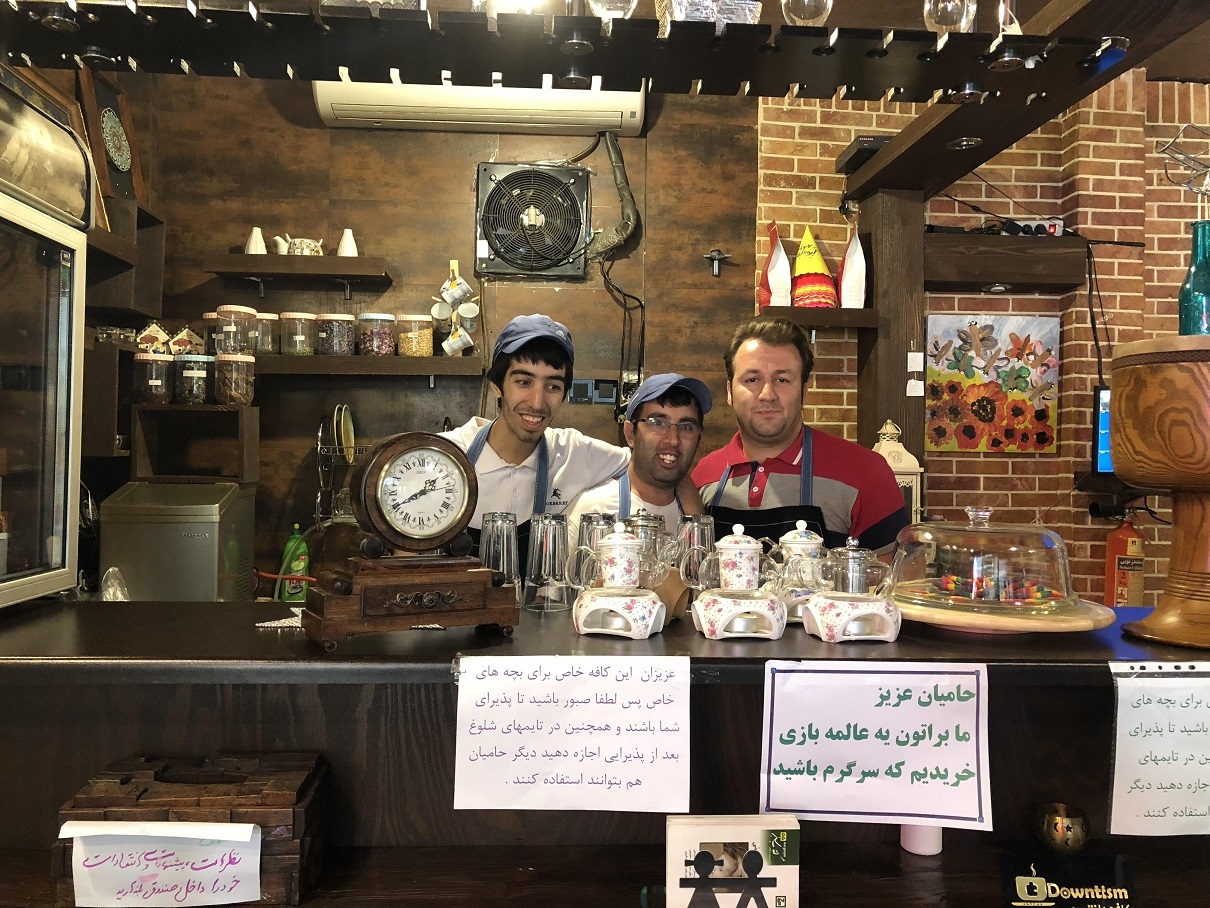
TEHRAN - As Mehdi Khakyan’s hands move skilfully across the piano keys, the soft chatter in the room subsides to hone in on the melody of Sultan-e-Ghalbha, a well-loved Iranian classic.
Salar Mohammady, the manager, trainer and head barista, is managing orders behind the coffee bar, while 19-year-old Ariya Azad, smiling, carefully serves aromatic cups of rose-infused tea to a table of customers.
From the outside, it could be mistaken for any cafe in Tehran’s affluent northern neighbourhoods - but Cafe Downtism is far from it.
New MEE newsletter: Jerusalem Dispatch
Sign up to get the latest insights and analysis on Israel-Palestine, alongside Turkey Unpacked and other MEE newsletters
Located in a quiet mall in the otherwise busy area of Vanak, Cafe Downtism opened its doors in May 2018, and in a short time, it has captured the hearts and minds of many Iranians.
As the name suggests, the day-to-day running of this small cafe is handled almost exclusively by young people with disabilities such as autism and Down's syndrome. They work in several roles, from taking and serving orders to playing the piano for customers.
The need to interact
The initial idea for Cafe Downtism came from Aylin Agahi, a 37-year-old musician and teacher with 17 years of experience working with people with autism and Down's syndrome.
In her work as a private music teacher to children and young people, Agahi has always encouraged her students to take part in professional concerts and competitions. However, she noticed that they would get increasingly upset and unsettled in the run-up to a show.
"I discovered that they were feeling anxious because they were so afraid of not getting through to the next round of the shows," she says. "It wasn’t so much about the music or the concert, it was the interaction with other people that made them so happy.
"They enjoyed being encouraged and cheered for by the audience. They loved showing their talents to the world, but most of all they enjoyed being seen. It was after this that I decided to do something for them."
According to figures, in 2017 one out of every 150 babies was born with autism in Iran. Although this figure is not as high as other countries when compared to global numbers, it is a sizeable and vulnerable section of Iranian society.
In January last year, Iran's then-health minister, Hassan Qazizadeh-Hashemi, said that an estimated 30,000 children are born with Down syndrome per 1.5 million births in the country - or one in 50.
The customers are wonderful. They bear with us if the service is delayed or the quality is lower. They are always understanding of the circumstances and they support us
- Salar Mohammedy, manager, Downtism cafe
And in June, Human Rights Watch published a report on the position of people with disabilities in Iran, which found that they regularly face stigma and discrimination from government social workers, healthcare workers and others. Unemployment among people with disabilities is at 60 percent - significantly higher than the national average of 12.4 percent in 2017.
Such stark figures justify the need for institutions and establishments such as Cafe Downtism, whose importance goes far beyond financial support and employment, as it combats prejudice and discrimination and gives valuable members of society a chance to contribute their talents.
'These guys learn so fast'
Mohammady is a trained barista who, aside from managing the cafe, is training the staff in how to run it themselves, including how to make tea and coffee, welcome customers, serve drinks, clean tables and prepare bills.
The working day is split into morning and afternoon shifts. On a given day, there are approximately 10-12 people employees, with a total of 38 people currently employed at the cafe.
Mehdi Khakyan, 31, and Ariya Azad, 19, were diagnosed with autism at the ages of three and four respectively. Smart, young, and polite, both are eager to work hard and show passion in what they do.
"These guys learn so fast," says Mohammady. "They help me a lot. Mr Mehdi is a professional at cheese and crackers. He’s great. They are so talented and more importantly, they really want to learn."
Azad happily chimes in to speaks about his own progress. "I’m learning new things," he says, "like how to wash dishes and clean the doors."
Setbacks and challenges
Agahi tells MEE that financial difficulties have been the cafe's biggest challenge since the idea for its opening first emerged.
Start-up costs amounted to around 70 million rials ($1,668) and included rent for space, furniture and equipment for making drinks. The cafe is still waiting for a possible grant from the Iranian Social Welfare Organisation, which has still to arrive despite initial interest in supporting the project.
The organisation is the main government agency tasked with providing services to people with disabilities. In HRW's report, however, some of the people with disabilities interviewed said that on occasion the employees of the agency did not provide essential information about services and equipment available to them, and that its procedures were lengthy and complex.
"When I first took my business plan to the Iranian Social Welfare Organisation, I told them that I wanted to open this cafe but needed some financial support, and they agreed to do so on the condition that I was open and vocal about their help," Agahi says.
Instead, Agahi has personally funded large amounts of the costs herself, as well as borrowing money from 15 of the families of the children to who she has taught music. They have been supportive and shared her hope that the cafe would benefit not only their own children but others in a similar position.
If this wasn’t difficult enough, the sudden drop in the value of the Iranian rial, exacerbated by the recent re-imposition of US sanctions, means that fewer ordinary Iranians now have the luxury of spending their money on cafe excursions. The cafe's costs have also increased, from their monthly rent to the raw ingredients they need for drinks.
Another big obstacle for the cafe is its location, hidden away on the top floor of Ayneh Vanak, a small and deserted mall. Unlike cafes located elsewhere in the city which stay open until 11pm or midnight, Cafe Downtism is forced to close before the mall shuts at 9pm, limiting its customer intake.
Cafe Downtism has also been prohibited from advertising at the entrance of the mall, which has made it near impossible to attract new customers: those who come are usually through social media or by word of mouth.
The part played by customers
Like in many big cities, it can be hard to find a true sense of community in Tehran. That applies to cafes and restaurants, where there is often very little connection between servers and customers.
However, at Cafe Downtism, staff are eager to engage customers in conversation and go out of their way to ensure that everyone leaves happy.
We want all people around Tehran, Iran and from around the world to come to us and see us, to see how we work
- Salar Mohammedy, manager, Downtism cafe
According to Mohammady, the clientele is very supportive and come with a genuine appreciation of the establishment. "The customers are wonderful. They bear with us if the service is delayed or the quality is lower. They are always understanding of the circumstances and they support us."
The space is also used to showcase the talents and skills of staff. Live piano music is played by Mehdi and other employees whenever there is a spare moment throughout the day, while an array of artworks painted by staff decorate the cafe walls.
Handicrafts such as beaded jewellery and wall hangings are also available for sale, the profits of which go towards running costs.
Music has formed an important part of the cafe from its inception, thanks to the influence of Agahi. In addition to the piano, some employees also play the organ or the tonbak, a traditional Iranian drum.
Unfortunately, Mohammady tells MEE that due to budget restrictions, not all of the instruments the staff can play are currently available at the cafe. But there is hope that one day all of them will have the opportunity to show their talents to the world.
Looking to the future, despite the odds
In the future, the team hopes to find a bigger and more open space, expand facilities, and increase their capacity to serve more customers, although financially this dream is a long way off.
"We would love to get to the point where we can set up different branches elsewhere in Tehran, in other cities like Karaj and Qazvin – for these guys, for their future so that they can be self-sufficient," says Mohammady.
Both she and Agahi see it as an essential service and highlight that people with special needs are often hidden from society in Iran because their families fear that they will face prejudice.
However, the irony is that the more secluded they are secluded, the more misunderstanding and prejudice will result. It is this isolation from the rest of society that Cafe Downtism aims to combat.
But despite the odds, the team want to continue to work hard and show the world they are more than able to give something unique to their community.
Mehdi looks forward to the future and the possibility of getting more experience.
"We want people to support us," he says. "We want all people around Tehran, Iran and from around the world to come to us and see us, to see how we work."
Despite the odds working against this small cafe, the team continue to work hard, serving customers with much care and attention. They want to show the world they are more than able to give something unique to their community.
This article is available in French on Middle East Eye French edition.
Middle East Eye delivers independent and unrivalled coverage and analysis of the Middle East, North Africa and beyond. To learn more about republishing this content and the associated fees, please fill out this form. More about MEE can be found here.


